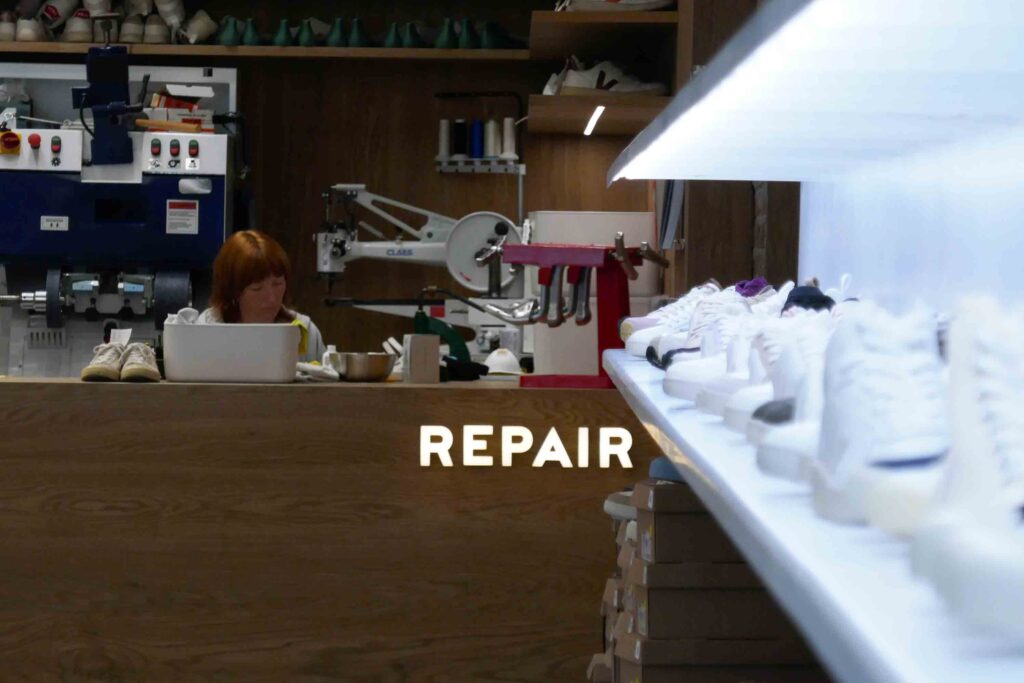Primark In New York. How Ethical Is The Fast Fashion Retailer?

Share This Article
Primark announced a new store in NYC’s Herald Sq. But is this fast fashion retailer making changes to be sustainable and ethical?
The negative impacts of fast fashion– microplastic pollution, toxic chemicals, slave labor, etc. – are gaining traction, but these retailers aren’t slowing down. This month, Primark, an international clothing retailer, announced the opening of its first Manhattan location – the city’s iconic Herald Square. Yet, with Ethics and Sustainability Progress Reports and pilot projects to reduce waste and toxic chemicals and engage in fair wage programs, the question stands- how ethical is one of the world’s most well-known fast fashion retailers.
Reviewing the company’s reports, pledges, and press releases, The Wellness Feed highlights areas Primark is taking ethical steps in the right direction and areas where they could do better to reach its sustainable goals.
Plastics v.s Natural Materials
Like most retailers during the fall, Primark has launched its latest offering of comfy sweaters and knits. The downside is that if you quickly scroll over these autumnal finds you’ll notice a majority of these new items are made from polyester and acrylic, plastic – based materials. In an effort to clean up plastic waste and reuse items like single-use plastic water bottles, Primark has launched collections made from recycled yarns sourced from post consumer plastic. But, the fact remains that plastic will become microplastic waste.
Microplastics are a major issue in the war against plastic pollution. These small pieces of plastic, less than 5 millimeters long, come from a variety of sources, but the most noteworthy source is clothing. An estimated 70% of clothing is polyester, a plastic-based material. Every time polyester clothing is washed microplastics break off and pass through water filtration systems and end up in our oceans. This cycle has posed a threat to marine life and our own bodies with microplastics found everywhere from our drinking water to fetuses. Experts warn that microplastics can pose hazards to our health from inflammation to tissue deterioration.
Buzzword Breakdown: Does Modal Live Up To The Sustainable Hype?
Viscose, modal, and lyocell, materials sourced from the cellulose of plants, are also used throughout Primark collections. However, a majority of these items are still polyester or nylon blends and make up a fraction of the items on the retailer’s website. Elsewhere the retailer has made a 2027 pledge to have all of its cotton either organic, recycled, or sourced from the Primark Cotton Project, a sustainable cotton program. Since 2013, this program has been an initiative to train and support cotton farmers to conserve water and use fewer pesticides and fertilizers.
Recycling
Earlier this year, the EU announced regulations on textile waste that will be begin in 2026. Reacting to the announcement, fast fashion companies Zara, H&M, Mango, and Primark made their own announcement about a voluntary pilot program to collect discarded textiles from clothing to bed linens to reuse or recycle them. In the U.S., Primark is partnering with Yellow Octopus, a circular business, whose donation boxes are set up in Primark stores for customers to discard their unwanted clothing. From there, clothing will either be donated to be worn again or repurposed into items like insulation and stuffing for toys.
Durability
It’s been a little-known fact that fast fashion is made to fall apart at the seams- literally. Some reports have stated that clothing from fast fashion retailers is made to last a maximum of 10 wears to perpetuate a linear make, buy, waste model. This year, Primark addressed this issue by publishing its ‘Primark Durability Framework’, guidelines for durable, longer-lasting clothing. The guidelines include a compliance level for areas such as a minimum number of washes ( ideally 45) before clothing deteriorates. Primark commissioned a study from the University of Leeds (UOL) School of Design, to test its clothing and other retailers with price ranges from $6 to $195. The findings showed that price isn’t a marker of durability. But, the study did not take into account fabrics, wages, or other ethical concerns impacting clothing.
Ditch Fast Fashion For These 12 Organic & Fair Trade Cardigans
Even the most durable clothing will need to be repaired. In 2021, Primark launched its ‘Love it for Longer’ repair workshop program where customers were trained how to hand sew and make small repairs. “Customers can continue to wear their favourite clothes for longer. It’s an important step towards our goal of strengthening the durability of our clothing by 2025,” Vicki Swain, Product longevity and sustainability lead at Primark stated in a press release. While have the skills to repair clothing yourself is essential, in the age of convenience, it isn’t necessarily as useful compared to being able to have a retailer repair clothing for you.
Overall Ethical Impact
Fast fashion retailers rely heavily on a linear take-make-waste business model. Furthermore these brands are known for a high turnover of styles and products. Some produce hundreds of new styles weekly. Even though Primark has introduced several sustainable initiatives such as recycling, organic cotton, and repairing programs, it has yet to fully address the environmental and social issues of the standard fast fashion model. Until, then sustainable brands that implement organic materials across the board, invest in living wages, and offer repair and take-back programs for all of its clothing, are a better option to fast fashion retailers like Primark.




